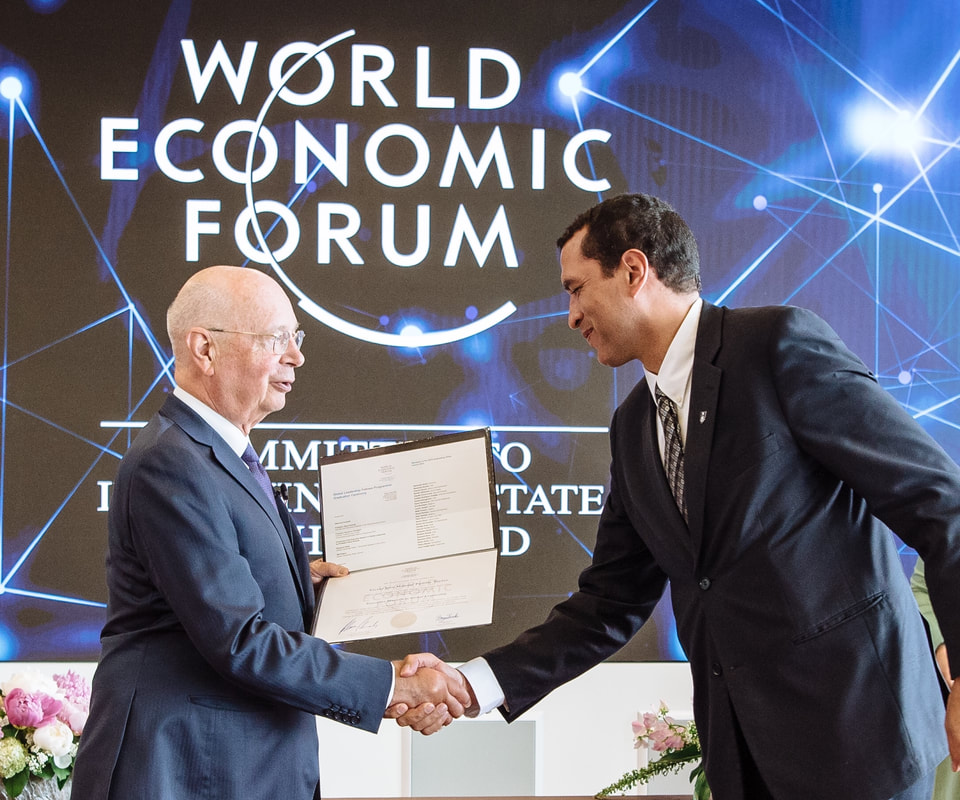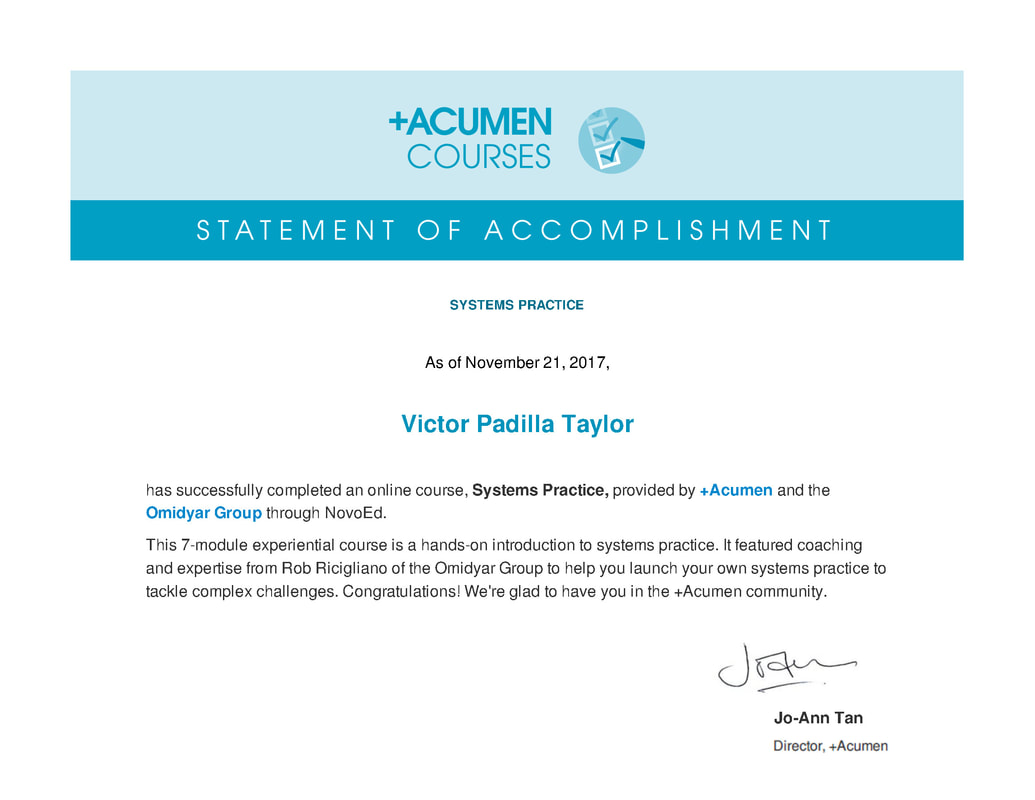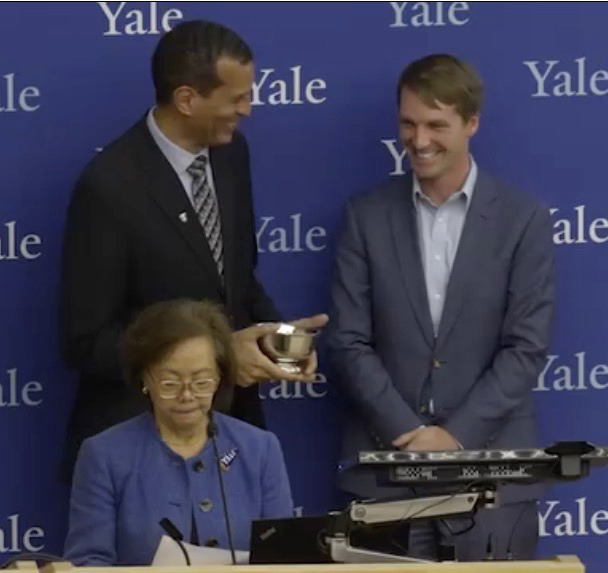There is nothing more practical than good theory
|
In a world that has turned more fractured than before, working at the World Economic Forum as a Global Leadership Fellow (GLF) has given me opportunities to re-evaluate globalization both at the existential and instrumental levels. At the existential level, I see a world that currently seems to be going back to tribalism. The Forum has responded directly to this trend by pointing out to the consequences of a world that moves away from shared values and interests. But there is another instrumental level where globalization is also being recalibrated: leadership and management styles are becoming more fluid because past and highly valued Western values are not recognized anymore as the only benchmarks for success. For every Apple and Facebook out there, there is an Alibaba and WeChat now.
In this context, the Forum has truly been a unique place of professional and personal learning that only a few other places in the world can also be. Every year, the Forum selects a few candidates amongst 6000+ applications to take part in its unique Global Leadership Fellows Programme, which combines intensive work with inspiring learning experiences around the world. The programme is developed in partnership with INSEAD, The Wharton School, Columbia University, London Business School, China Europe International Business School and THNK School of Creative Leadership over the course of three years. And its design and delivery are based on the «Agile Servant Leader» framework, which helps participants to develop self-awareness, a global mindset, contextual intelligence, and the ability to think and intervene systemically in business and societal issues. Grateful for this incredible opportunity, I graduated from the programme on May 2018 with an Executive Master's in Global Leadership. As a Global Leadership Fellow (GLF), I have changed multiple times my management roles and styles to serve many of our diverse communities. After all, I knew back in 2015 that I had joined the Forum ‘to improve the state of the world’, not to improve the state of ‘my world’. And even though I also knew about the importance of multi-stakeholder collaboration, I quickly realized that the convening power of this international organization provided me with an incomparable opportunity to create sustainable impact where business and society meet and work together. I learned to ‘map the issues’ and to identify proper institutional interventions that have the power to make our global systems healthier. I learned systems leadership, its mindsets, approaches and tools. If you are a leader for business and society (this is the ‘motto’ of my business school at Yale University), there is no shortage of diversity of action at the Forum: from community engagement to project management; from idea generation to insight curation; and from content creation to knowledge dissemination. I feel grateful for the trust I received to add, not to extract, to the Forum’s mission. Some of this work was uncharted territory for me and I grew in awareness of my choices as I traveled the new roads. And some of this work brought opportunities and the agency to shape my outcomes, even when navigating ambiguous objectives and unclear limits. After taking detailed stock of my everyday hustle during the past three years, which came on top of four hours of daily commute time between my home in New Haven, Connecticut, and New York City, I truly feel proud about these achievements and about how I managed to ‘struggle well’: • I interacted with senior executives of complex partner accounts and convinced them to increase their level of engagement in Forum activities. • I learned to manage and consolidate the outputs of the Forum’s Global Agenda Council on the Future of Logistics and Supply Chains in 2015-2016, which also led my team to entrust me with an evolved version of this group of cross-industry experts: the Global Future Council on the Future of Mobility, whose 25 members I personally interviewed, nominated and onboarded. • I facilitated the public-private dialogue of experts from the Global Agenda Council with officials from the Government of Panama, which included a mission trip to the country to scope the activities needed to deploy a Logistics Control Tower. • As a facilitator of an impactful public-private partnership supporting the humanitarian community, I contributed to the expansion of activities of the Logistics Emergency Teams to include disaster preparedness in addition to its emergency response relief and assistance during complex crises. • I assisted the Logistics Emergency Teams during the 2017 flooding crisis in Peru by facilitating the coordination efforts between this partnership and the government. • I contributed to the design and delivery of a three-day training workshop in May 2017 for a group of employees of the Logistics Emergency Teams to prepare them to respond to natural disaster crises. • I participated in the creation and promotion of new narratives to communicate the efforts of the Logistics Emergency Teams activities. • I scoped the ideation of a new social impact project by organizing two sessions at Forum events (India Economic Summit 2016, Annual Meeting 2017) which ultimately led to its internal approval and support of two Forum Project Advisors who presented bids to launch my idea. • I coordinated internal Forum resources and those of Deloitte Consulting LLC to deliver the objectives for a project dealing with ‘transportation poverty’ (SIMSystem: Designing Seamless Integrated Mobility). • I organized three dynamic project workshops on ‘transportation interoperability’ in the cities of Berlin, New York and Japan; I also organized and delivered sessions at an Industry Strategy Officers meeting, two Annual Meetings, one Summit of Global Agenda Councils, two Summits of Global Future Councils and workshops at Mexico City (Enabling Trade), Miami and Dubai (LET training) and New York (launch of Community for Effective Humanitarian Response). • I coordinated the internal Forum resources and those of the consulting firm Bain & Company to deliver the objectives of a trade facilitation project (Enabling Trade: Unlocking the Potential of Mexico and Vietnam). • I presented the Enabling Trade Index framework to the Government of Mexico as an approach to their efforts to gain regulatory support for the implementation of the Bali trade agreement. • I supported the Head of Supply Chain and Transport in growing the Industry community of partner companies, Chief Executive Officers and Heads of Strategy • I contributed to the launch of the following publications: The New Silk Road, Idea and Concept; Digital Transformation of Industries, Logistics Industry; Enabling Trade, Unlocking the Potential of Mexico and Vietnam; How Technology Can Unlock the Growth Potential along the New Silk Road; Designing a Seamless Integrated Mobility System, A Manifesto for Transforming Passenger and Goods Mobility; Hurdles ahead along the “New Silk Road” (published in Financial Times), also published in the Forum’s Agenda website; “There's one wall Mexico could break down” (published in Business Insider). • I supported via coaching three female members of the Mobility team on the topic of constructive feedback. • I collaborated on the translation to Spanish of the First Edition of “The Fourth Industrial Revolution” book written by the Chairman Klaus Schwab; and • I collaborated with Human Resources to represent the Forum at recruiting events at Yale University. For all these activities, I became a quicker learner, more analytical, more tactful in my communications with others, a better listener and an active examiner of the truth. Often I needed to restrain my overconfidence and leave it out the door. But I recognize that I would not have been able to perform as described above, in the mature and tempered manner often required during stressful situations, without the support and guidance of internal and external coaches and mentors, colleagues and my GLF peers sharing this exciting journey. Now that I have graduated from the GLF programme, the year of 2018 finds me feeling more passionate about social impact. I hope to continue ‘connecting the dots’ between systemic issues with the help of my acquired systems thinking practice. I trust that with good communications skills, along with my improved storytelling, the next chapter will bring me closer to more opportunities to pitch internally and externally new ideas for the betterment of society. I have become a believer of the theory of change that system leaders encourage. Sustainable change is not about mission accomplished, it is about creating healthy systems. It is not just about seeing problems; it is also about recognizing patterns. And it is not just about planning and control; we need the capacity to learn and adapt. I want to continue traveling the journey of a systems leader, who acts holistically and moves away from compartmentalized approaches. Systems leaders push for the search of the hidden causes underneath the visible aspects of a problem, decipher its related trends through time and intervene with modest but carefully designed actions to achieve meaningful and sustainable impact. The world can be a place of discovery through the application of systems leadership. And this practice can help us give people a sense of agency, direction, hope and collective purpose. For this incredible journey, after assessing my numerous lessons learned, I clearly find that the World Economic Forum is truly a unique place for advanced contextual learning.
1 Comment
Opposition is not an uncommon situation to be found in all areas of public life. But I see every day in the news the intensification of battles in the world. Systems practice could be used to find new ways to navigate these turbulent times towards common social goals.
The recent history of the world had given me hope in the actions of global leaders guiding society towards a peaceful convergence of thought, actions and goals. The Millenium Development Goals, and now the Sustainable Development Goals, are good examples of this. We all want more opportunities and agency for our lives, and these positive goals and the actions of leaders promised to guide us there. But formidable forces, both operating openly and behind the scenes, are creating events and the constant remapping of global systems in a way that limits our collective capacity to reach agreements. It feels that reaching a destination where we can find more resilience, more education, more health and less poverty for all is only a dream. Systems practice can return some agency to us. A renowned professor in this field that guided Global Leadership Fellows on this methodology said: systems practice is a new type of technology and architecture of thought that can produce the key insights to guide our navigation through an increasingly connected, complex and chaotic world. Systems practice, as a new modern filing system, stands against the reductionist views of the world where problems stay solved once a solution has been found for the first time. Systems practitioners know better: they are able to recognize the common occurrence of unintended consequences that proves that keeping our conversations open after applying traditional fixes to our problems is a necessity. I particularly liked the illustration offered around this topic of leaders as ‘circular’ thinkers. This illustration has challenged my own thinking and has prompted to depart from a mindset acquired after many years of training as an engineer. Once engineers learn equations and variables to control in physical and chemical systems, they expect outputs to be produced forever if those systems are provided with the right kind of inputs and controls. Discovering that this is not the way things work for social systems is both refreshing and enlightening. Intuitively, I knew this, and before I found myself conflicted inside. Now learning systems mapping techniques has helped me to understand this reality and has given me more hope and the confidence to lead in these turbulent and modern times. The learnings from systems practice also enhanced my trust in evidence-based thinking to solve our global problems. I honestly resent and fear at the same time the rising power of false narratives that have overtaken our collective thinking by brute force. Social media has helped these untruths to gain strength, for it only takes a few words on Twitter or Facebook and virtual bots to make these false narratives viral and mainstream. Systems practice is good practice for true leadership because it provides a more realistic 3D view of truth. Systems practice supports evidence-based storytelling. This practice gives me depth to discover upstream causes for the downstream outputs of a system, while also giving me the liberty to expose my assumptions, fight my own biases and discover second order forces in the systems I intervene. The theory of change supported by systems practice is encouraging. It is not about mission accomplished, but about creating healthy systems. It is not just about problems, but about recognizing patterns. It is not about planning and control, but about our capacity to adapt. The systems practice methodology creates space for discovery and disclosure in a world where so much despair and distrust exists. Feedback finds its rightful place beyond interpersonal and group dynamics as we recognize the existence of interconnected loops between forces in a system. We must recognize this if we are to truly understand a system, its present outcomes and its future possibilities. Change implemented through regular action, growing care and increased knowledge will be more sustainable and impactful. And decision rules must stop being mostly opportunistic and start giving people a sense of direction and hope. My work at the World Economic Forum has already benefitted from this training on systems practice. I am already using the tools to discuss with my partners the implications of new technologies in transportation poverty (poverty created by lack of transport access), or to explain the importance of establishing new processes of innovation in the humanitarian community. Combined with design thinking skills, systems practice becomes a powerful, creative and inclusive exercise for the communities I manage. I can be an active contributor that catalyzes rich conversations, prompts the right kind of questions and promotes consistent engagement from those who hold the required expertise and the power to create compelling change. One of my favorite mandates reinforced during my Global Leadership Fellowship is taking perspectives from others. In support of this mandate, systems practice provides me with dynamic boxes inside which I can place these perspectives for the good collective use. Systems practice also invites me to make my listening to others more open and less controlling. After all, control is futile in systems leadership because a solution today can easily become a problem tomorrow. Therefore, I am now more open to accepting that whatever brought me ‘here’ as an engineer, etc., may not be valid anymore to take me ‘there’ as a global leader. Systems practice is a great tool and proxy for leadership in our VUCA (volatile, uncertain, complex and ambiguous) times. When most voices today call for friction and either/or positions, systems practice can set us free from the prison of our own cognitive frameworks. This training will be truly useful in my leadership toolkit when guiding others in this era of fractured narratives and more intense battles for the minds of men. Below is a sample system map created for the question: How might we make investing in humanitarian innovation a mainstream activity for public and private actors seeking to build together social resilience ahead of humanitarian crises? Members of the network of Global Future Councils meet annually in the United Arab Emirates, and virtually several times a year to monitor trends, identify global risks, discuss ideas and explore interconnections between issues.
Transformation maps (TMs) collectively are a unique knowledge platform uncovering the transformations that are reshaping our world. These maps seamlessly integrate via TopLink a curation of the the latest thinking of top leaders and experts in 120+ insight areas.
They also provide visibility into weak signals in complex systems by exposing feedback loops and critical connectors using advanced network analytics. Global, regional and industry issues can be easily analized via the connections represented with these instantly available and updated source of knowledge. Knowledge is relevant and evidence-based decision making is still possible when solving real-world problems. Try TopLink to generate your own insight briefing.
In June 2016, the World Economic Forum issued a document called "Systems Leadership and Platform Engagement Opportunities". The document was written to promote our aspiration to use a systemic approach while working to close the many gaps that exist in global systems today from trade to long-term investment, from healthcare to food security, or from energy to natural resource security and the environment. After my training on systems practice by the Omidyar Network, I will be attempting to merge the Forum's aspiration with the mindsets, processes and tools that I learned. What follows is an initial reflection on trade supported by its corresponding systems map.
After pressing Start, click the three dots (•••) in the middle of the screen to hide/show texts
See this systemic reflection in full screen here |
AuthorVictor Padilla-Taylor is Director of Networks at the Tsai Center for Innovative Thinking at Yale. He was the 2021 recipient of the Linda Lorimer Award for Distinguished Service, conferred by Yale’s president on staff who have demonstrated their commitment to innovative thinking and the educational and research missions of the university. He also serves as board leader at Global Consortium for Entrepreneurship Centers, Long Wharf Theatre, Yale SOM Alumni Advisory Board, and Saint Thomas More Chapel and Center at Yale University. For his accomplishments as alumni volunteer, he received the 2023 Yale Alumni Leadership Award for his service and innovative leadership as nominated and selected by alumni relations staff members. AlpsBoundA global soul with MBA experience from GNAM schools around the world Archives
October 2023
Categories
All
|



 RSS Feed
RSS Feed